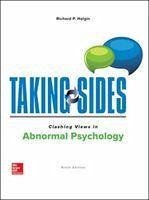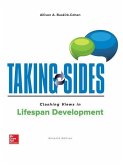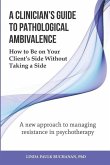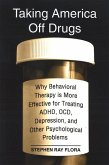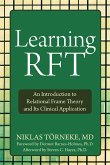Richard P Halgin
Taking Sides: Clashing Views in Abnormal Psychology
Richard P Halgin
Taking Sides: Clashing Views in Abnormal Psychology
- Broschiertes Buch
- Merkliste
- Auf die Merkliste
- Bewerten Bewerten
- Teilen
- Produkt teilen
- Produkterinnerung
- Produkterinnerung
The Taking Sides Collection on McGraw-Hill Create® includes current controversial issues in a debate-style forma designed to stimulate student interest and develop critical thinking skills. This Collection contains a multitude of current and classic issues to enhance and customize your course. You can browse the entire Taking Sides Collection on Create or you can search by topic, author, or keywords. Each Taking Sides issue is thoughtfully framed with Learning Outcomes, an Issue Summary, an Introduction, and an "Exploring the Issue" section featuring Critical Thinking and Reflection, Is There…mehr
Andere Kunden interessierten sich auch für
![Taking Sides: Clashing Views in Lifespan Development Taking Sides: Clashing Views in Lifespan Development]() Allison Buskirk-CohenTaking Sides: Clashing Views in Lifespan Development92,99 €
Allison Buskirk-CohenTaking Sides: Clashing Views in Lifespan Development92,99 €![A Clinician's Guide to Pathological Ambivalence: How to Be on Your Client's Side Without Taking a Side A Clinician's Guide to Pathological Ambivalence: How to Be on Your Client's Side Without Taking a Side]() Linda Paulk BuchananA Clinician's Guide to Pathological Ambivalence: How to Be on Your Client's Side Without Taking a Side48,99 €
Linda Paulk BuchananA Clinician's Guide to Pathological Ambivalence: How to Be on Your Client's Side Without Taking a Side48,99 €![Taking America Off Drugs Taking America Off Drugs]() Stephen Ray FloraTaking America Off Drugs39,99 €
Stephen Ray FloraTaking America Off Drugs39,99 €![Not So Abnormal Psychology Not So Abnormal Psychology]() Ronald B MillerNot So Abnormal Psychology50,99 €
Ronald B MillerNot So Abnormal Psychology50,99 €![Taking Play Seriously Taking Play Seriously]() Ole Fredrik LillemyrTaking Play Seriously62,99 €
Ole Fredrik LillemyrTaking Play Seriously62,99 €![Annual Editions Annual Editions]() Karen Grover DuffyAnnual Editions21,99 €
Karen Grover DuffyAnnual Editions21,99 €![Learning Rft Learning Rft]() Niklas TörnekeLearning Rft56,99 €
Niklas TörnekeLearning Rft56,99 €-
-
-
The Taking Sides Collection on McGraw-Hill Create® includes current controversial issues in a debate-style forma designed to stimulate student interest and develop critical thinking skills. This Collection contains a multitude of current and classic issues to enhance and customize your course. You can browse the entire Taking Sides Collection on Create or you can search by topic, author, or keywords. Each Taking Sides issue is thoughtfully framed with Learning Outcomes, an Issue Summary, an Introduction, and an "Exploring the Issue" section featuring Critical Thinking and Reflection, Is There Common Ground?, Additional Resources, and Internet References. Go to the Taking Sides Collection on McGraw-Hill Create® at www.mcgrawhillcreate.com/takingsides and click on "Explore this Collection" to browse the entire Collection. Select individual Taking Sides issues to enhance your course, or access and select the entire Halgin: Taking Sides: Clashing Views in Abnormal Psychology, 9/e book here http://create.mheducation.com/createonline/index.html#qlink=search%2Ftext%3Disbn:1259903907 for an easy, pre-built teaching resource. Visit http://create.mheducation.com for more information on other McGraw-Hill titles and special collections.
Hinweis: Dieser Artikel kann nur an eine deutsche Lieferadresse ausgeliefert werden.
Hinweis: Dieser Artikel kann nur an eine deutsche Lieferadresse ausgeliefert werden.
Produktdetails
- Produktdetails
- Verlag: Dushkin Publishing
- 9th edition
- Seitenzahl: 384
- Erscheinungstermin: 6. November 2017
- Englisch
- Abmessung: 272mm x 216mm x 15mm
- Gewicht: 771g
- ISBN-13: 9781259903908
- ISBN-10: 1259903907
- Artikelnr.: 49663080
- Herstellerkennzeichnung
- Libri GmbH
- Europaallee 1
- 36244 Bad Hersfeld
- 06621 890
- Verlag: Dushkin Publishing
- 9th edition
- Seitenzahl: 384
- Erscheinungstermin: 6. November 2017
- Englisch
- Abmessung: 272mm x 216mm x 15mm
- Gewicht: 771g
- ISBN-13: 9781259903908
- ISBN-10: 1259903907
- Artikelnr.: 49663080
- Herstellerkennzeichnung
- Libri GmbH
- Europaallee 1
- 36244 Bad Hersfeld
- 06621 890
Professor Halgin received his Ph. D. from Fordham University, and completed a 3-year fellowship in the Department of Psychiatry at New York Hospital-Cornell Medical Center, prior to joining the faculty of the University of Massachusetts in 1977. He is a Board Certified Clinical Psychologist and has had over two decades of clinical, supervisory, and consulting experience. At the University of Massachusetts, his course in Abnormal Psychology is one of the most popular offerings on campus, attracting an enrollment of more than 500 students each semester. In recent years, he has also offered this course at Amherst College and Smith College. His teaching has been recognized at the university and national level. A University of Massachusetts Alumni Distinguished Professor, he was honored with the University's Distinguished Teaching Award and his teaching was recognized by the Society for the Teaching of Psychology of the American Psychological Association. In April 2003, his teaching was highlighted in the Chronicle of Higher Education. Professor Halgin is the author of more than fifty journal articles and book chapters in the fields of psychotherapy, clinical supervision, and professional issues in psychology.
Unit 1: Psychological Conditions and Treatments
Issue: Is the Addiction Model Appropriate for Treating Compulsive Sexual
Behaviors?
YES: Isaac Abel, from "Was I Actually 'Addicted' to Internet Pornography?"
The Atlantic (2013)
NO: Marty Klein, from "Why 'Sexual Addiction' Is Not a Useful Diagnosis-And
Why It Matters," martyklein.com (2016)
Issue: Is Attention-Deficit/Hyperactivity Disorder (ADHD) a Real Disorder?
YES: National Institute of Mental Health (NIMH), from "Attention Deficit
Hyperactivity Disorder (ADHD)," National Institute of Mental Health (2014)
NO: Tim O'Shea, D.C., from "ADD: A Designer Disease," The Doctor Within
(2014)
Issue: Should Asperger's Syndrome Be a Diagnosis Distinct from Autism
Spectrum Disorder?
YES: Dania Jekel and Nomi Kaim, from "Asperger's: Too Valuable to Lose,"
Original Work (2017)
NO: Francesca Happé and Jon Sutton, from "A Creative, Interpersonal, Social
Scientist," The Psychologist (2014)
Issue: Is Alcoholics Anonymous (A.A) an Ineffective Treatment Based on
Pseudoscience?
YES: Gabrielle Glaser, from "The Irrationality of Alcoholics Anonymous,"
The Atlantic (2015)
NO: Sarah A. Benton, from "Critique of Gabrielle Glaser's Atlantic Article
'Irrationality of AA'," Original Work (2015)
Issue: Is "Social Transitioning" a Beneficial Treatment for Transgender
Children?
YES: Kristina Olson and Lily Durwood, from "Are Parents Rushing to Turn
Their Boys Into Girls?" Slate (2016) NO: Alice Dreger, from "The Big
Problem with Outlawing Gender Conversion Therapies," Wired (2015)
Issue: Should Psychiatric Asylums Be Reestablished as a Treatment Option
for Long-term, Inpatient Care?
YES: H. Richard Lamb and Linda E. Weinberger, from "Rediscovering the
Concept of Asylum for Persons with Serious Mental Illness," The Journal of
the American Academy of Psychiatry and the Law (2016)
NO: Julian C. Hughes, from "Objections and Merits: A Commentary on
'Improving Long-term Psychiatric Care: Bring Back the Asylum' by Sisti,
Segal, and Emanuel," Journal of Ethics in Mental Health (2015)
Unit 2: The Trend toward Biological Interventions
Issue: Do We Still Need Psychiatrists?
YES: Steven Moffic, from "Why We Still Need Psychiatrists!" Mad in America
(2012)
NO: Steven Balt, from "Yes, We Still Need Psychiatrists, but for What?"
The Carlat Psychiatry Report (2012)
Issue: Is Addiction a Brain Disease?
YES: National Institute on Drug Abuse, from "Drugs, Brain, and Behavior:
The Science of Addiction," National Institute on Drug Abuse (2014)
NO: Sally Satel and Scott O. Lilienfeld, from "Addiction and the
Brain-Disease Fallacy," Frontiers in Psychiatry (2014)
Issue: Should Memory-Dampening Drugs Be Used to Prevent and Treat Trauma in
Combat Soldiers?
YES: Elise Donovan, from "Propranolol Use in the Prevention and Treatment
of Posttraumatic Stress Disorder in Military Veterans: Forgetting Therapy
Revisited," Perspectives in Biology and Medicine (2010)
NO: The President's Council on Bioethics, from "Beyond Therapy:
Biotechnology and the Pursuit of Happiness," President's Council on
Bioethics (2003)
Issue: Should Brain Stimulation Therapies Be Used in Efforts to
Rehabilitate Psychopathic Criminals?
YES: Sergio Canavero, from "Criminal Minds: Neuromodulation of the
Psychopathic Brain," Frontiers in Human Neuroscience (2014)
NO: Dietmar Hübner and Lucie White, from "Neurosurgery for Psychopaths? An
Ethical Analysis," AJOB Neuroscience (2016)
Issue: Is Marijuana a Viable Treatment Option for Psychiatric Disorders?
YES: Will Hall, from "Marijuana for Mental Health Conditions?" Everything
Matters: Beyond Meds (2015)
NO: Bernard Woodward, from "Marijuana and the Psychiatric Patient,"
Psychiatric Times (2017)
Unit 3: Social, Ethical, and Legal Issues
Issue: Does Research Confirm That Violent Video Games Are Harmful to
Minors?
YES: Leland Y. Yee and Steven F. Gruel, from "Brief of Amicus Curiae in
Case of Brown v. Entertainment Merchants Association," U.S. Supreme Court
(2010)
NO: Patricia A. Millett, from "Brief of Amici Curiae in Brown v.
Entertainment Merchants Association," U.S. Supreme Court (2010)
Issue: Must Mentally Ill Murderers Have a Rational Understanding of Why
They Are Being Sentenced to Death?
YES: American Psychological Association, American Psychiatric Association,
and National Alliance on Mental Illness, from "Brief for Amici Curiae
American Psychological Association, American Psychiatric Association, and
National Alliance on Mental Illness in Support of Petitioner," U.S. Supreme
Court (2007)
NO: Greg Abbott et al., from "On Writ of Certiorari to the United States
Court of Appeals for the Fifth Circuit: Brief for the Respondent," U.S.
Supreme Court (2007)
Issue: Are Trigger Warnings Destructive in College Classrooms?
YES: Richard E. Vatz, from "The Academically Destructive Nature of Trigger
Warnings," First Amendment Studies (2016)
NO: Eleanor A. Lockhart, from "Why Trigger Warnings are Beneficial, Perhaps
Even Necessary," First Amendment Studies (2016)
Issue: Is the Use of Aversive Treatment an Inhumane Intervention for
Psychologically Disordered Individuals?
YES: Laurie Ahern and Eric Rosenthal, from "Torture Not Treatment: Electric
Shock and Long-term Restraint in the United States on Children and Adults
with Disabilities at the Judge Rotenberg Center," Mental Disability Rights
International (2010)
NO: Matthew L. Israel, from "Aversives at JRC: A Better Alternative to the
Use of Drugs, Restraint, Isolation, Warehousing, or Expulsion in the Treatm
ent of Severe Behavior Disorders," Judge Rotenberg Center (2010)
Issue: Is Forced Treatment of Seriously Mentally Ill Individuals
Justifiable?
YES: Samuel J. Brakel and John M. Davis, from "Overriding Mental Health
Treatment Refusals: How Much Process Is 'Due'?" Saint Louis University Law
Journal (2007)
NO: James B. Gottstein, from "How the Legal System Can Help Create a
Recovery Culture in Mental Health Systems," Alternatives 2005: Leading the
Transformation to Recovery (2005)
Issue: Should Solitary Confinement Be Considered Psychological Torture and
Be Outlawed for Inmates with Mental Illness?
YES: Reena Kapoor, from "Taking the Solitary Confinement Debate Out of
Isolation," The Journal of the American Academy of Psychiatry and the Law
(2014)
NO: U.S. Department of Justice, from "Inmates with Serious Mental Illness
(SMI)," U.S. Department of Justice Report and Recommendations Concerning
the Use of Restrictive Housing (2016)
Issue: Is the Internet Damaging Teen Brains?
YES: Chandra Johnson, from "Growing Up Digital: How the Internet Affects
Teen Identity," Deseret News (2014)
NO: Lauren Sherman, from "Internet and the Teen Brain: What Do We Know, and
What Should We Be Asking?" Psychology in Action (2014)
Issue: Does Pornography Reduce the Incidence of Rape? YES: Anthony D'Amato,
from "Porn Up, Rape Down," Northwestern University School of Law, Public
Law and Legal Theory Research Paper Series (2012)
NO: Darwin, from "Does Porn Prevent Rape?" Catholic Exchange (2012)
Issue: Should Individuals Convicted of Lower-tier Sexually Related Crimes
Be Listed on the Sex Offender Registry?
YES: John G. Malcolm, from "The Sex Offender Registration and Notification
Act: A Sensible and Workable Law that Helps Keep Us Safe," Engage (2012)
NO: Carla Schultz, from "The Stigmatization of Individuals Convicted of Sex
Offenses: Labeling Theory and the Sex Offense Registry," Themis: Research
Journal of Justice Studies and Forensic Science (2014)
Issue: Is the Addiction Model Appropriate for Treating Compulsive Sexual
Behaviors?
YES: Isaac Abel, from "Was I Actually 'Addicted' to Internet Pornography?"
The Atlantic (2013)
NO: Marty Klein, from "Why 'Sexual Addiction' Is Not a Useful Diagnosis-And
Why It Matters," martyklein.com (2016)
Issue: Is Attention-Deficit/Hyperactivity Disorder (ADHD) a Real Disorder?
YES: National Institute of Mental Health (NIMH), from "Attention Deficit
Hyperactivity Disorder (ADHD)," National Institute of Mental Health (2014)
NO: Tim O'Shea, D.C., from "ADD: A Designer Disease," The Doctor Within
(2014)
Issue: Should Asperger's Syndrome Be a Diagnosis Distinct from Autism
Spectrum Disorder?
YES: Dania Jekel and Nomi Kaim, from "Asperger's: Too Valuable to Lose,"
Original Work (2017)
NO: Francesca Happé and Jon Sutton, from "A Creative, Interpersonal, Social
Scientist," The Psychologist (2014)
Issue: Is Alcoholics Anonymous (A.A) an Ineffective Treatment Based on
Pseudoscience?
YES: Gabrielle Glaser, from "The Irrationality of Alcoholics Anonymous,"
The Atlantic (2015)
NO: Sarah A. Benton, from "Critique of Gabrielle Glaser's Atlantic Article
'Irrationality of AA'," Original Work (2015)
Issue: Is "Social Transitioning" a Beneficial Treatment for Transgender
Children?
YES: Kristina Olson and Lily Durwood, from "Are Parents Rushing to Turn
Their Boys Into Girls?" Slate (2016) NO: Alice Dreger, from "The Big
Problem with Outlawing Gender Conversion Therapies," Wired (2015)
Issue: Should Psychiatric Asylums Be Reestablished as a Treatment Option
for Long-term, Inpatient Care?
YES: H. Richard Lamb and Linda E. Weinberger, from "Rediscovering the
Concept of Asylum for Persons with Serious Mental Illness," The Journal of
the American Academy of Psychiatry and the Law (2016)
NO: Julian C. Hughes, from "Objections and Merits: A Commentary on
'Improving Long-term Psychiatric Care: Bring Back the Asylum' by Sisti,
Segal, and Emanuel," Journal of Ethics in Mental Health (2015)
Unit 2: The Trend toward Biological Interventions
Issue: Do We Still Need Psychiatrists?
YES: Steven Moffic, from "Why We Still Need Psychiatrists!" Mad in America
(2012)
NO: Steven Balt, from "Yes, We Still Need Psychiatrists, but for What?"
The Carlat Psychiatry Report (2012)
Issue: Is Addiction a Brain Disease?
YES: National Institute on Drug Abuse, from "Drugs, Brain, and Behavior:
The Science of Addiction," National Institute on Drug Abuse (2014)
NO: Sally Satel and Scott O. Lilienfeld, from "Addiction and the
Brain-Disease Fallacy," Frontiers in Psychiatry (2014)
Issue: Should Memory-Dampening Drugs Be Used to Prevent and Treat Trauma in
Combat Soldiers?
YES: Elise Donovan, from "Propranolol Use in the Prevention and Treatment
of Posttraumatic Stress Disorder in Military Veterans: Forgetting Therapy
Revisited," Perspectives in Biology and Medicine (2010)
NO: The President's Council on Bioethics, from "Beyond Therapy:
Biotechnology and the Pursuit of Happiness," President's Council on
Bioethics (2003)
Issue: Should Brain Stimulation Therapies Be Used in Efforts to
Rehabilitate Psychopathic Criminals?
YES: Sergio Canavero, from "Criminal Minds: Neuromodulation of the
Psychopathic Brain," Frontiers in Human Neuroscience (2014)
NO: Dietmar Hübner and Lucie White, from "Neurosurgery for Psychopaths? An
Ethical Analysis," AJOB Neuroscience (2016)
Issue: Is Marijuana a Viable Treatment Option for Psychiatric Disorders?
YES: Will Hall, from "Marijuana for Mental Health Conditions?" Everything
Matters: Beyond Meds (2015)
NO: Bernard Woodward, from "Marijuana and the Psychiatric Patient,"
Psychiatric Times (2017)
Unit 3: Social, Ethical, and Legal Issues
Issue: Does Research Confirm That Violent Video Games Are Harmful to
Minors?
YES: Leland Y. Yee and Steven F. Gruel, from "Brief of Amicus Curiae in
Case of Brown v. Entertainment Merchants Association," U.S. Supreme Court
(2010)
NO: Patricia A. Millett, from "Brief of Amici Curiae in Brown v.
Entertainment Merchants Association," U.S. Supreme Court (2010)
Issue: Must Mentally Ill Murderers Have a Rational Understanding of Why
They Are Being Sentenced to Death?
YES: American Psychological Association, American Psychiatric Association,
and National Alliance on Mental Illness, from "Brief for Amici Curiae
American Psychological Association, American Psychiatric Association, and
National Alliance on Mental Illness in Support of Petitioner," U.S. Supreme
Court (2007)
NO: Greg Abbott et al., from "On Writ of Certiorari to the United States
Court of Appeals for the Fifth Circuit: Brief for the Respondent," U.S.
Supreme Court (2007)
Issue: Are Trigger Warnings Destructive in College Classrooms?
YES: Richard E. Vatz, from "The Academically Destructive Nature of Trigger
Warnings," First Amendment Studies (2016)
NO: Eleanor A. Lockhart, from "Why Trigger Warnings are Beneficial, Perhaps
Even Necessary," First Amendment Studies (2016)
Issue: Is the Use of Aversive Treatment an Inhumane Intervention for
Psychologically Disordered Individuals?
YES: Laurie Ahern and Eric Rosenthal, from "Torture Not Treatment: Electric
Shock and Long-term Restraint in the United States on Children and Adults
with Disabilities at the Judge Rotenberg Center," Mental Disability Rights
International (2010)
NO: Matthew L. Israel, from "Aversives at JRC: A Better Alternative to the
Use of Drugs, Restraint, Isolation, Warehousing, or Expulsion in the Treatm
ent of Severe Behavior Disorders," Judge Rotenberg Center (2010)
Issue: Is Forced Treatment of Seriously Mentally Ill Individuals
Justifiable?
YES: Samuel J. Brakel and John M. Davis, from "Overriding Mental Health
Treatment Refusals: How Much Process Is 'Due'?" Saint Louis University Law
Journal (2007)
NO: James B. Gottstein, from "How the Legal System Can Help Create a
Recovery Culture in Mental Health Systems," Alternatives 2005: Leading the
Transformation to Recovery (2005)
Issue: Should Solitary Confinement Be Considered Psychological Torture and
Be Outlawed for Inmates with Mental Illness?
YES: Reena Kapoor, from "Taking the Solitary Confinement Debate Out of
Isolation," The Journal of the American Academy of Psychiatry and the Law
(2014)
NO: U.S. Department of Justice, from "Inmates with Serious Mental Illness
(SMI)," U.S. Department of Justice Report and Recommendations Concerning
the Use of Restrictive Housing (2016)
Issue: Is the Internet Damaging Teen Brains?
YES: Chandra Johnson, from "Growing Up Digital: How the Internet Affects
Teen Identity," Deseret News (2014)
NO: Lauren Sherman, from "Internet and the Teen Brain: What Do We Know, and
What Should We Be Asking?" Psychology in Action (2014)
Issue: Does Pornography Reduce the Incidence of Rape? YES: Anthony D'Amato,
from "Porn Up, Rape Down," Northwestern University School of Law, Public
Law and Legal Theory Research Paper Series (2012)
NO: Darwin, from "Does Porn Prevent Rape?" Catholic Exchange (2012)
Issue: Should Individuals Convicted of Lower-tier Sexually Related Crimes
Be Listed on the Sex Offender Registry?
YES: John G. Malcolm, from "The Sex Offender Registration and Notification
Act: A Sensible and Workable Law that Helps Keep Us Safe," Engage (2012)
NO: Carla Schultz, from "The Stigmatization of Individuals Convicted of Sex
Offenses: Labeling Theory and the Sex Offense Registry," Themis: Research
Journal of Justice Studies and Forensic Science (2014)
Unit 1: Psychological Conditions and Treatments
Issue: Is the Addiction Model Appropriate for Treating Compulsive Sexual
Behaviors?
YES: Isaac Abel, from "Was I Actually 'Addicted' to Internet Pornography?"
The Atlantic (2013)
NO: Marty Klein, from "Why 'Sexual Addiction' Is Not a Useful Diagnosis-And
Why It Matters," martyklein.com (2016)
Issue: Is Attention-Deficit/Hyperactivity Disorder (ADHD) a Real Disorder?
YES: National Institute of Mental Health (NIMH), from "Attention Deficit
Hyperactivity Disorder (ADHD)," National Institute of Mental Health (2014)
NO: Tim O'Shea, D.C., from "ADD: A Designer Disease," The Doctor Within
(2014)
Issue: Should Asperger's Syndrome Be a Diagnosis Distinct from Autism
Spectrum Disorder?
YES: Dania Jekel and Nomi Kaim, from "Asperger's: Too Valuable to Lose,"
Original Work (2017)
NO: Francesca Happé and Jon Sutton, from "A Creative, Interpersonal, Social
Scientist," The Psychologist (2014)
Issue: Is Alcoholics Anonymous (A.A) an Ineffective Treatment Based on
Pseudoscience?
YES: Gabrielle Glaser, from "The Irrationality of Alcoholics Anonymous,"
The Atlantic (2015)
NO: Sarah A. Benton, from "Critique of Gabrielle Glaser's Atlantic Article
'Irrationality of AA'," Original Work (2015)
Issue: Is "Social Transitioning" a Beneficial Treatment for Transgender
Children?
YES: Kristina Olson and Lily Durwood, from "Are Parents Rushing to Turn
Their Boys Into Girls?" Slate (2016) NO: Alice Dreger, from "The Big
Problem with Outlawing Gender Conversion Therapies," Wired (2015)
Issue: Should Psychiatric Asylums Be Reestablished as a Treatment Option
for Long-term, Inpatient Care?
YES: H. Richard Lamb and Linda E. Weinberger, from "Rediscovering the
Concept of Asylum for Persons with Serious Mental Illness," The Journal of
the American Academy of Psychiatry and the Law (2016)
NO: Julian C. Hughes, from "Objections and Merits: A Commentary on
'Improving Long-term Psychiatric Care: Bring Back the Asylum' by Sisti,
Segal, and Emanuel," Journal of Ethics in Mental Health (2015)
Unit 2: The Trend toward Biological Interventions
Issue: Do We Still Need Psychiatrists?
YES: Steven Moffic, from "Why We Still Need Psychiatrists!" Mad in America
(2012)
NO: Steven Balt, from "Yes, We Still Need Psychiatrists, but for What?"
The Carlat Psychiatry Report (2012)
Issue: Is Addiction a Brain Disease?
YES: National Institute on Drug Abuse, from "Drugs, Brain, and Behavior:
The Science of Addiction," National Institute on Drug Abuse (2014)
NO: Sally Satel and Scott O. Lilienfeld, from "Addiction and the
Brain-Disease Fallacy," Frontiers in Psychiatry (2014)
Issue: Should Memory-Dampening Drugs Be Used to Prevent and Treat Trauma in
Combat Soldiers?
YES: Elise Donovan, from "Propranolol Use in the Prevention and Treatment
of Posttraumatic Stress Disorder in Military Veterans: Forgetting Therapy
Revisited," Perspectives in Biology and Medicine (2010)
NO: The President's Council on Bioethics, from "Beyond Therapy:
Biotechnology and the Pursuit of Happiness," President's Council on
Bioethics (2003)
Issue: Should Brain Stimulation Therapies Be Used in Efforts to
Rehabilitate Psychopathic Criminals?
YES: Sergio Canavero, from "Criminal Minds: Neuromodulation of the
Psychopathic Brain," Frontiers in Human Neuroscience (2014)
NO: Dietmar Hübner and Lucie White, from "Neurosurgery for Psychopaths? An
Ethical Analysis," AJOB Neuroscience (2016)
Issue: Is Marijuana a Viable Treatment Option for Psychiatric Disorders?
YES: Will Hall, from "Marijuana for Mental Health Conditions?" Everything
Matters: Beyond Meds (2015)
NO: Bernard Woodward, from "Marijuana and the Psychiatric Patient,"
Psychiatric Times (2017)
Unit 3: Social, Ethical, and Legal Issues
Issue: Does Research Confirm That Violent Video Games Are Harmful to
Minors?
YES: Leland Y. Yee and Steven F. Gruel, from "Brief of Amicus Curiae in
Case of Brown v. Entertainment Merchants Association," U.S. Supreme Court
(2010)
NO: Patricia A. Millett, from "Brief of Amici Curiae in Brown v.
Entertainment Merchants Association," U.S. Supreme Court (2010)
Issue: Must Mentally Ill Murderers Have a Rational Understanding of Why
They Are Being Sentenced to Death?
YES: American Psychological Association, American Psychiatric Association,
and National Alliance on Mental Illness, from "Brief for Amici Curiae
American Psychological Association, American Psychiatric Association, and
National Alliance on Mental Illness in Support of Petitioner," U.S. Supreme
Court (2007)
NO: Greg Abbott et al., from "On Writ of Certiorari to the United States
Court of Appeals for the Fifth Circuit: Brief for the Respondent," U.S.
Supreme Court (2007)
Issue: Are Trigger Warnings Destructive in College Classrooms?
YES: Richard E. Vatz, from "The Academically Destructive Nature of Trigger
Warnings," First Amendment Studies (2016)
NO: Eleanor A. Lockhart, from "Why Trigger Warnings are Beneficial, Perhaps
Even Necessary," First Amendment Studies (2016)
Issue: Is the Use of Aversive Treatment an Inhumane Intervention for
Psychologically Disordered Individuals?
YES: Laurie Ahern and Eric Rosenthal, from "Torture Not Treatment: Electric
Shock and Long-term Restraint in the United States on Children and Adults
with Disabilities at the Judge Rotenberg Center," Mental Disability Rights
International (2010)
NO: Matthew L. Israel, from "Aversives at JRC: A Better Alternative to the
Use of Drugs, Restraint, Isolation, Warehousing, or Expulsion in the Treatm
ent of Severe Behavior Disorders," Judge Rotenberg Center (2010)
Issue: Is Forced Treatment of Seriously Mentally Ill Individuals
Justifiable?
YES: Samuel J. Brakel and John M. Davis, from "Overriding Mental Health
Treatment Refusals: How Much Process Is 'Due'?" Saint Louis University Law
Journal (2007)
NO: James B. Gottstein, from "How the Legal System Can Help Create a
Recovery Culture in Mental Health Systems," Alternatives 2005: Leading the
Transformation to Recovery (2005)
Issue: Should Solitary Confinement Be Considered Psychological Torture and
Be Outlawed for Inmates with Mental Illness?
YES: Reena Kapoor, from "Taking the Solitary Confinement Debate Out of
Isolation," The Journal of the American Academy of Psychiatry and the Law
(2014)
NO: U.S. Department of Justice, from "Inmates with Serious Mental Illness
(SMI)," U.S. Department of Justice Report and Recommendations Concerning
the Use of Restrictive Housing (2016)
Issue: Is the Internet Damaging Teen Brains?
YES: Chandra Johnson, from "Growing Up Digital: How the Internet Affects
Teen Identity," Deseret News (2014)
NO: Lauren Sherman, from "Internet and the Teen Brain: What Do We Know, and
What Should We Be Asking?" Psychology in Action (2014)
Issue: Does Pornography Reduce the Incidence of Rape? YES: Anthony D'Amato,
from "Porn Up, Rape Down," Northwestern University School of Law, Public
Law and Legal Theory Research Paper Series (2012)
NO: Darwin, from "Does Porn Prevent Rape?" Catholic Exchange (2012)
Issue: Should Individuals Convicted of Lower-tier Sexually Related Crimes
Be Listed on the Sex Offender Registry?
YES: John G. Malcolm, from "The Sex Offender Registration and Notification
Act: A Sensible and Workable Law that Helps Keep Us Safe," Engage (2012)
NO: Carla Schultz, from "The Stigmatization of Individuals Convicted of Sex
Offenses: Labeling Theory and the Sex Offense Registry," Themis: Research
Journal of Justice Studies and Forensic Science (2014)
Issue: Is the Addiction Model Appropriate for Treating Compulsive Sexual
Behaviors?
YES: Isaac Abel, from "Was I Actually 'Addicted' to Internet Pornography?"
The Atlantic (2013)
NO: Marty Klein, from "Why 'Sexual Addiction' Is Not a Useful Diagnosis-And
Why It Matters," martyklein.com (2016)
Issue: Is Attention-Deficit/Hyperactivity Disorder (ADHD) a Real Disorder?
YES: National Institute of Mental Health (NIMH), from "Attention Deficit
Hyperactivity Disorder (ADHD)," National Institute of Mental Health (2014)
NO: Tim O'Shea, D.C., from "ADD: A Designer Disease," The Doctor Within
(2014)
Issue: Should Asperger's Syndrome Be a Diagnosis Distinct from Autism
Spectrum Disorder?
YES: Dania Jekel and Nomi Kaim, from "Asperger's: Too Valuable to Lose,"
Original Work (2017)
NO: Francesca Happé and Jon Sutton, from "A Creative, Interpersonal, Social
Scientist," The Psychologist (2014)
Issue: Is Alcoholics Anonymous (A.A) an Ineffective Treatment Based on
Pseudoscience?
YES: Gabrielle Glaser, from "The Irrationality of Alcoholics Anonymous,"
The Atlantic (2015)
NO: Sarah A. Benton, from "Critique of Gabrielle Glaser's Atlantic Article
'Irrationality of AA'," Original Work (2015)
Issue: Is "Social Transitioning" a Beneficial Treatment for Transgender
Children?
YES: Kristina Olson and Lily Durwood, from "Are Parents Rushing to Turn
Their Boys Into Girls?" Slate (2016) NO: Alice Dreger, from "The Big
Problem with Outlawing Gender Conversion Therapies," Wired (2015)
Issue: Should Psychiatric Asylums Be Reestablished as a Treatment Option
for Long-term, Inpatient Care?
YES: H. Richard Lamb and Linda E. Weinberger, from "Rediscovering the
Concept of Asylum for Persons with Serious Mental Illness," The Journal of
the American Academy of Psychiatry and the Law (2016)
NO: Julian C. Hughes, from "Objections and Merits: A Commentary on
'Improving Long-term Psychiatric Care: Bring Back the Asylum' by Sisti,
Segal, and Emanuel," Journal of Ethics in Mental Health (2015)
Unit 2: The Trend toward Biological Interventions
Issue: Do We Still Need Psychiatrists?
YES: Steven Moffic, from "Why We Still Need Psychiatrists!" Mad in America
(2012)
NO: Steven Balt, from "Yes, We Still Need Psychiatrists, but for What?"
The Carlat Psychiatry Report (2012)
Issue: Is Addiction a Brain Disease?
YES: National Institute on Drug Abuse, from "Drugs, Brain, and Behavior:
The Science of Addiction," National Institute on Drug Abuse (2014)
NO: Sally Satel and Scott O. Lilienfeld, from "Addiction and the
Brain-Disease Fallacy," Frontiers in Psychiatry (2014)
Issue: Should Memory-Dampening Drugs Be Used to Prevent and Treat Trauma in
Combat Soldiers?
YES: Elise Donovan, from "Propranolol Use in the Prevention and Treatment
of Posttraumatic Stress Disorder in Military Veterans: Forgetting Therapy
Revisited," Perspectives in Biology and Medicine (2010)
NO: The President's Council on Bioethics, from "Beyond Therapy:
Biotechnology and the Pursuit of Happiness," President's Council on
Bioethics (2003)
Issue: Should Brain Stimulation Therapies Be Used in Efforts to
Rehabilitate Psychopathic Criminals?
YES: Sergio Canavero, from "Criminal Minds: Neuromodulation of the
Psychopathic Brain," Frontiers in Human Neuroscience (2014)
NO: Dietmar Hübner and Lucie White, from "Neurosurgery for Psychopaths? An
Ethical Analysis," AJOB Neuroscience (2016)
Issue: Is Marijuana a Viable Treatment Option for Psychiatric Disorders?
YES: Will Hall, from "Marijuana for Mental Health Conditions?" Everything
Matters: Beyond Meds (2015)
NO: Bernard Woodward, from "Marijuana and the Psychiatric Patient,"
Psychiatric Times (2017)
Unit 3: Social, Ethical, and Legal Issues
Issue: Does Research Confirm That Violent Video Games Are Harmful to
Minors?
YES: Leland Y. Yee and Steven F. Gruel, from "Brief of Amicus Curiae in
Case of Brown v. Entertainment Merchants Association," U.S. Supreme Court
(2010)
NO: Patricia A. Millett, from "Brief of Amici Curiae in Brown v.
Entertainment Merchants Association," U.S. Supreme Court (2010)
Issue: Must Mentally Ill Murderers Have a Rational Understanding of Why
They Are Being Sentenced to Death?
YES: American Psychological Association, American Psychiatric Association,
and National Alliance on Mental Illness, from "Brief for Amici Curiae
American Psychological Association, American Psychiatric Association, and
National Alliance on Mental Illness in Support of Petitioner," U.S. Supreme
Court (2007)
NO: Greg Abbott et al., from "On Writ of Certiorari to the United States
Court of Appeals for the Fifth Circuit: Brief for the Respondent," U.S.
Supreme Court (2007)
Issue: Are Trigger Warnings Destructive in College Classrooms?
YES: Richard E. Vatz, from "The Academically Destructive Nature of Trigger
Warnings," First Amendment Studies (2016)
NO: Eleanor A. Lockhart, from "Why Trigger Warnings are Beneficial, Perhaps
Even Necessary," First Amendment Studies (2016)
Issue: Is the Use of Aversive Treatment an Inhumane Intervention for
Psychologically Disordered Individuals?
YES: Laurie Ahern and Eric Rosenthal, from "Torture Not Treatment: Electric
Shock and Long-term Restraint in the United States on Children and Adults
with Disabilities at the Judge Rotenberg Center," Mental Disability Rights
International (2010)
NO: Matthew L. Israel, from "Aversives at JRC: A Better Alternative to the
Use of Drugs, Restraint, Isolation, Warehousing, or Expulsion in the Treatm
ent of Severe Behavior Disorders," Judge Rotenberg Center (2010)
Issue: Is Forced Treatment of Seriously Mentally Ill Individuals
Justifiable?
YES: Samuel J. Brakel and John M. Davis, from "Overriding Mental Health
Treatment Refusals: How Much Process Is 'Due'?" Saint Louis University Law
Journal (2007)
NO: James B. Gottstein, from "How the Legal System Can Help Create a
Recovery Culture in Mental Health Systems," Alternatives 2005: Leading the
Transformation to Recovery (2005)
Issue: Should Solitary Confinement Be Considered Psychological Torture and
Be Outlawed for Inmates with Mental Illness?
YES: Reena Kapoor, from "Taking the Solitary Confinement Debate Out of
Isolation," The Journal of the American Academy of Psychiatry and the Law
(2014)
NO: U.S. Department of Justice, from "Inmates with Serious Mental Illness
(SMI)," U.S. Department of Justice Report and Recommendations Concerning
the Use of Restrictive Housing (2016)
Issue: Is the Internet Damaging Teen Brains?
YES: Chandra Johnson, from "Growing Up Digital: How the Internet Affects
Teen Identity," Deseret News (2014)
NO: Lauren Sherman, from "Internet and the Teen Brain: What Do We Know, and
What Should We Be Asking?" Psychology in Action (2014)
Issue: Does Pornography Reduce the Incidence of Rape? YES: Anthony D'Amato,
from "Porn Up, Rape Down," Northwestern University School of Law, Public
Law and Legal Theory Research Paper Series (2012)
NO: Darwin, from "Does Porn Prevent Rape?" Catholic Exchange (2012)
Issue: Should Individuals Convicted of Lower-tier Sexually Related Crimes
Be Listed on the Sex Offender Registry?
YES: John G. Malcolm, from "The Sex Offender Registration and Notification
Act: A Sensible and Workable Law that Helps Keep Us Safe," Engage (2012)
NO: Carla Schultz, from "The Stigmatization of Individuals Convicted of Sex
Offenses: Labeling Theory and the Sex Offense Registry," Themis: Research
Journal of Justice Studies and Forensic Science (2014)

